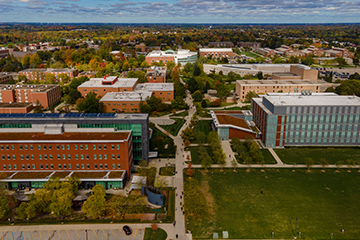Illuminating research in neurodegenerative disorders
Advanced methods use light-based therapies for brain health improvement
Ute Hochgeschwender in the College of Medicine has been awarded several recent NIH grants for her studies to better understand how the brain functions. The grants build on her team’s development of novel research methods funded by The BRAIN Initiative.
A collaborative grant “Targeted Circuit Manipulation for Ameliorating Huntington's Disease Pathogenesis” was awarded to Hochgeschwender and her colleague Julien Rossignol. The grant focuses on applying the technology to models of Huntington’s disease which is when nerve cells in the brain deteriorate.
Using their cutting-edge molecular tool, the ‘optical synapse’, the researchers are hoping to slow the decay of the nerve cells and eventually eliminate the disease. Researchers control nerve cells using light emitting enzymes and light detecting molecules. In Huntington’s disease a group of cells in one region excessively fires and stimulates another group of cells in a different region, leading to the typical movement disorder. By having the overactive cells produce the light emitter and the receiving cells harbor a light-sensing molecule that suppresses the cell’s activity, they are able to dampen the disease effects.
Hochgeschwender is also applying the approach to additional diseases. The Hochgeschwender lab is collaborating with the Chu lab at Georgetown University on “Targeted Cortical Circuit Manipulation in Parkinson's Disease” where they are applying the novel technology in a Parkinson’s disease model. A collaboration with the de Lecea lab from Stanford on “Functional Circuit Dissection of the HCRT System” focuses on the hypocretin (HCRT) system, the nerve cells that regulate reward behaviors and the sleep/wake cycle of animals and humans. The project explores the ‘optical synapse’ as a novel method in potential new therapies for insomnia or to adjust wakefulness or energy of animals and humans.
This story is brought to you by the Office of Research and Graduate Studies.




